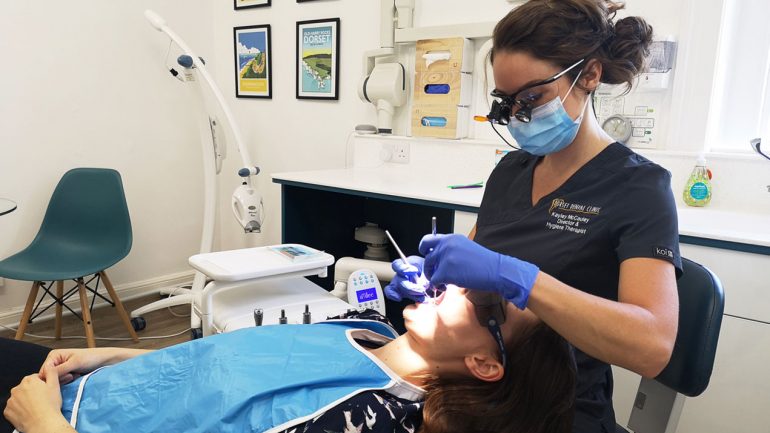Dorset Dental Clinic answer all your questions about why it is important to visit the dental hygienists and therapists.
What is the dental hygienist’s role in the practice?
Dental hygienists are mainly concerned with ‘preventive’ dental health and treating gum disease – showing you correct home care and helping you to keep your teeth and gums healthy. This includes professionally cleaning your teeth by removing plaque and tartar (usually called a ‘scale and polish’) However, perhaps their most important role is showing you the best way to keep your teeth free of plaque. Plaque is a sticky coating that forms constantly on your teeth. Hygienists also give advice about diet and preventing tooth decay.
What is the dental therapist’s role in the practice?
As well as doing all the work that a dental hygienist does, a dental therapist can also carry out some dental procedures that patients are more used to a dentist doing. A dental therapist can do fillings, extract ‘baby’ teeth, place preformed crowns on baby teeth and do treatments using all the materials a dentist would use. As long as an adult tooth does not need treatment to the nerve of the tooth, a dental therapist can fill or restore any part of the tooth that needs treatment. They do not do restorations, such as crowns, to adult teeth.
Dental hygiene therapists also take dental x-rays, place fissure sealants, apply fluoride varnishes and administer fluoride treatments. Tooth whitening is also often carried out by the dental hygiene therapist, under a prescription from your dentist.
Why is this dental treatment important?
Regular professional cleaning to remove plaque and tartar, combined with looking after your teeth and gums properly at home, will help keep your mouth healthy. A clean and healthy mouth will improve your appearance, help you to keep your teeth and give you fresh breath.
Can a hygienist help prevent dental disease?
This is what the training of the hygienist is all about. They will carefully remove the hard deposits of calculus that build up on the teeth and teach you how to prevent them coming back. This will do a lot to slow the progress of gum disease.
Why doesn’t the dentist do this work?
Some dentists will do this type of work themselves. However, many now realise that the hygienist has been specially trained to carry out scaling and polishing and can spend longer with you. They are also expert at teaching you how to look after your teeth and gums. Often the hygienist/therapist will spend several appointments getting the gums healthy ready for the dentist to restore the teeth with crowns.
Will the treatment hurt?
Scaling and polishing is usually pain free. We use airflow equipment to make sure you feel no pain during treatment.
Is the treatment expensive?
Costs of treatment will vary depending on what is being done, and from practice to practice. It is important to find out the cost before you start, by getting a written quotation.
CONTACT
T. 01202 973300
A. Dorset Dental Clinic, 3 Longfleet Road, Poole, BH15 2HN


Leave a Reply